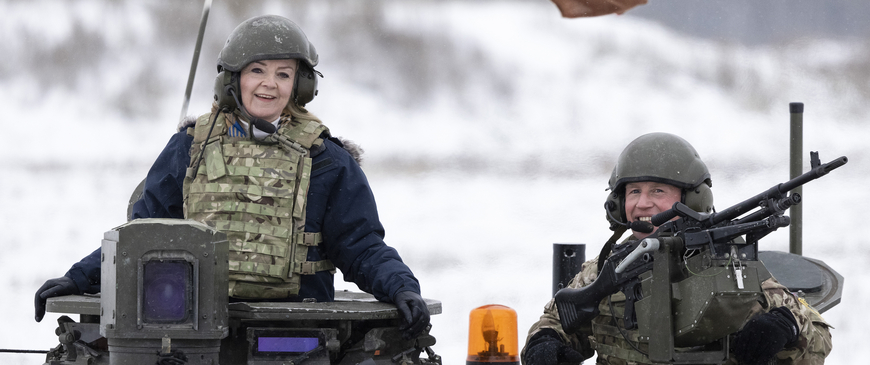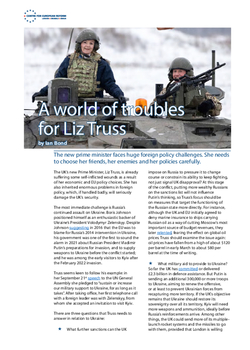
A world of troubles for Liz Truss
The new prime minister faces huge foreign policy challenges. She needs to choose her friends, her enemies and her policies carefully.
The UK’s new Prime Minister, Liz Truss, is already suffering some self-inflicted wounds as a result of her economic and EU policy choices. She has also inherited enormous problems in foreign policy, which, if handled badly, will seriously damage the UK’s security.
The most immediate challenge is Russia’s continued assault on Ukraine. Boris Johnson positioned himself as an enthusiastic backer of Ukraine’s President Volodymyr Zelenskyy. Despite Johnson suggesting in 2016 that the EU was to blame for Russia’s 2014 intervention in Ukraine, his government was one of the first to sound the alarm in 2021 about Russian President Vladimir Putin’s preparations for invasion, and to supply weapons to Ukraine before the conflict started; and he was among the early visitors to Kyiv after the February 2022 invasion.
Truss seems keen to follow his example: in her September 21st speech to the UN General Assembly she pledged to “sustain or increase our military support to Ukraine, for as long as it takes”. After taking office, her first telephone call with a foreign leader was with Zelenskyy, from whom she accepted an invitation to visit Kyiv.
There are three questions that Truss needs to answer in relation to Ukraine:
- What further sanctions can the UK impose on Russia to pressure it to change course or constrain its ability to keep fighting, not just signal UK disapproval? At this stage of the conflict, putting more wealthy Russians on the sanctions list will not influence Putin’s thinking, so Truss’s focus should be on measures that target the functioning of the Russian state more directly. For instance, although the UK and EU initially agreed to deny marine insurance to ships carrying Russian oil as a way of cutting Moscow’s most important source of budget revenues, they later relented, fearing the effect on global oil prices. Truss should examine the issue again: oil prices have fallen from a high of about $120 per barrel in early March to about $80 per barrel at the time of writing.
- What military aid to provide to Ukraine? So far the UK has committed or delivered £2.3 billion in defence assistance. But Putin is sending an additional 300,000 or more troops to Ukraine, aiming to renew the offensive, or at least to prevent Ukrainian forces from recapturing more territory. If the UK's objective remains that Ukraine should restore its sovereignty over all its territory, Kyiv will need more weapons and ammunition, ideally before Russia’s reinforcements arrive. Among other things, the UK could send more of its multiple-launch rocket systems and the missiles to go with them, provided that London is willing to tolerate the slightly increased security risk of running down its own stocks until it can procure or produce more.
- What reconstruction aid to provide to Ukraine? The extent of the devastation caused by Russia’s invasion means that Ukraine will need to rebuild on a scale not seen in Europe since the Second World War. The UK has so far provided about £1.5 billion in non-military aid to Ukraine. The government should look at whether it could confiscate frozen Russian assets and use those to fund additional help for Ukraine. Having reduced its overseas aid budget from 0.7 per cent of GDP to 0.5 per cent, however, the UK may struggle to fund its share of Ukraine’s needs without deep cuts in aid spending for the rest of the world. Such cuts would potentially undermine another of Truss’s stated aims, namely providing an alternative to funding for developing countries from “malign regimes” (as she called them in her New York speech, presumably in a reference to China, among others). Domestic economic problems and a weaker pound will make it harder still for the government to maintain overseas aid spending, let alone increase it.
Putting more wealthy Russians on the sanctions list will not influence Putin’s thinking at this stage, so Truss’s focus should be on measures that target the functions of the Russian state more directly.
Truss will also have to decide whether in a planned update of the March 2021 UK Integrated Review of Security, Defence, Development and Foreign Policy, she should shift towards more confrontation with China. The integrated review pointed to a balance between engagement and wariness: “We will continue to pursue a positive trade and investment relationship with China, while ensuring our national security and values are protected. We will also co-operate with China in tackling transnational challenges such as climate change”.
In favour of a firmer stance, the Truss government includes some of China’s harshest parliamentary critics, such as security minister Tom Tugendhat. The government has emphasised its commitment to the AUKUS alliance with the US and Australia, seen as a counter to China. On the other hand, with economic relations with the EU disrupted by Brexit and Truss having accepted that a free trade agreement with the US is many years off, the UK may not want to close off the possibility of more trade and investment ties with China. The government’s indecision over whether to allow a Chinese-owned company to take over a semi-conductor plant in Wales suggests that Truss’s team has not yet decided whether to treat China as more of a threat than an opportunity.
Truss’s team does not yet seem to have decided whether to treat China as more of a threat than an opportunity.
The update of the integrated review will also have to reflect Truss’s pledge to increase defence spending from 2 per cent to 3 per cent of GDP by 2030. Defence secretary Ben Wallace has warned that the larger budget will not necessarily be used to reinstate capabilities lost in recent years – instead, it will focus on the needs of modern warfare, including counter-drone technology and more long-range artillery. But inflation and the falling value of the pound will erode the real value of the increased budget. In addition, if demands on the National Health Service, social care and other areas of government spending increase, it may be politically difficult to increase defence spending. The government will have to decide what to prioritise and where to focus geographically: will it stick to plans to deploy more forces ‘East of Suez’, or increase its contribution to the defence of Europe?
Whatever decisions Truss takes on defence investment, she will want to ensure that the UK remains a useful partner for the US. She may not welcome President Joe Biden’s stress on the need for the UK to respect the Northern Ireland Protocol, but no UK prime minister can afford to neglect defence and intelligence co-operation with the US. At the same time, she (and future UK prime ministers) will need to take account of the risk of Donald Trump or another Trump-like figure becoming president. The memoirs of various former Trump administration officials show that he had to be persuaded not to pull the US out of NATO; but it might not be possible for officials to restrain a future president.
US withdrawal from NATO may be unlikely, but reduced American interest in Europe is enough of a risk that Truss should hedge against it. Thanks in part to its firm line on Russia and its contributions to NATO’s forward presence in Central Europe, the UK has good relations with some EU member-states, in particular Poland and the Nordic and Baltic states. With others, above all France, co-operation needs to be revitalised. As foreign secretary, Truss was willing to countenance limited, low-key practical co-ordination with the EU on foreign policy issues, in particular on sanctions. As prime minister, she should part company with Brexit fundamentalists and rebuild links with EU institutions and member-states on foreign, security and defence policy. She has taken charge at a time of foreign policy troubles; the UK needs all the friends it can find, even if they fly the EU flag.
Ian Bond is director of foreign policy at the Centre for European Reform.

